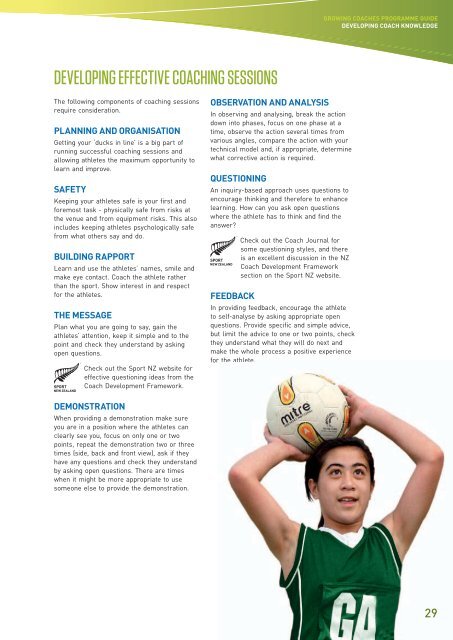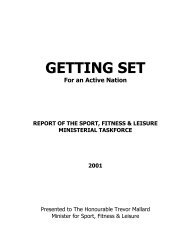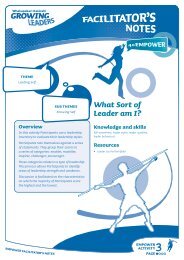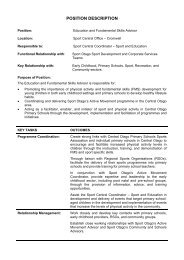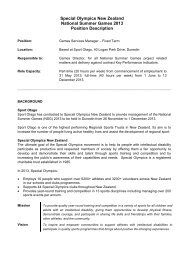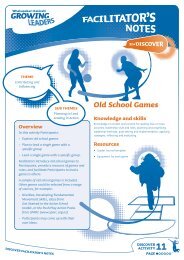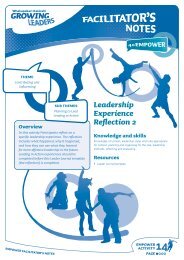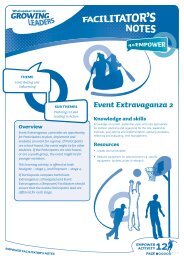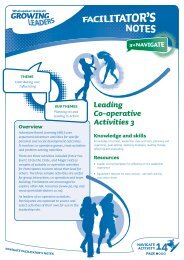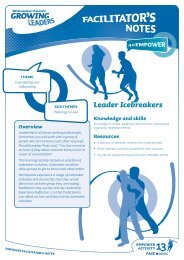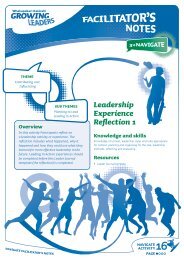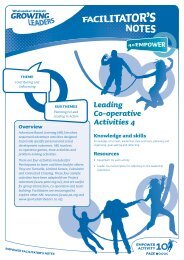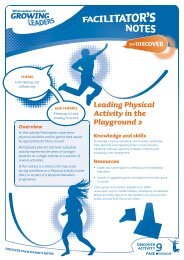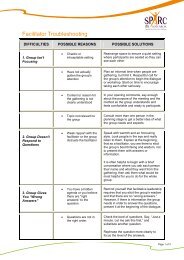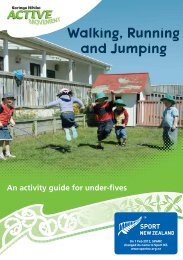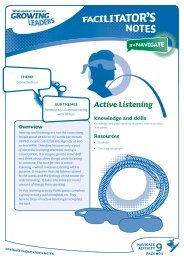Growing Coaches Programme Guide - Sport New Zealand
Growing Coaches Programme Guide - Sport New Zealand
Growing Coaches Programme Guide - Sport New Zealand
You also want an ePaper? Increase the reach of your titles
YUMPU automatically turns print PDFs into web optimized ePapers that Google loves.
GROWING COACHES PROGRAMME GUIDE<br />
DEVELOPING COACH KNOWLEDGE<br />
DEVELOPING EFFECTIVE COACHING SESSIONS<br />
The following components of coaching sessions<br />
require consideration.<br />
PLANNING AND ORGANISATION<br />
Getting your ‘ducks in line’ is a big part of<br />
running successful coaching sessions and<br />
allowing athletes the maximum opportunity to<br />
learn and improve.<br />
SAFETY<br />
Keeping your athletes safe is your first and<br />
foremost task - physically safe from risks at<br />
the venue and from equipment risks. This also<br />
includes keeping athletes psychologically safe<br />
from what others say and do.<br />
BUILDING RAPPORT<br />
Learn and use the athletes’ names, smile and<br />
make eye contact. Coach the athlete rather<br />
than the sport. Show interest in and respect<br />
for the athletes.<br />
THE MESSAGE<br />
Plan what you are going to say, gain the<br />
athletes’ attention, keep it simple and to the<br />
point and check they understand by asking<br />
open questions.<br />
Check out the <strong>Sport</strong> NZ website for<br />
effective questioning ideas from the<br />
Coach Development Framework.<br />
OBSERVATION AND ANALYSIS<br />
In observing and analysing, break the action<br />
down into phases, focus on one phase at a<br />
time, observe the action several times from<br />
various angles, compare the action with your<br />
technical model and, if appropriate, determine<br />
what corrective action is required.<br />
QUESTIONING<br />
An inquiry-based approach uses questions to<br />
encourage thinking and therefore to enhance<br />
learning. How can you ask open questions<br />
where the athlete has to think and find the<br />
answer?<br />
FEEDBACK<br />
Check out the Coach Journal for<br />
some questioning styles, and there<br />
is an excellent discussion in the NZ<br />
Coach Development Framework<br />
section on the <strong>Sport</strong> NZ website.<br />
In providing feedback, encourage the athlete<br />
to self-analyse by asking appropriate open<br />
questions. Provide specific and simple advice,<br />
but limit the advice to one or two points, check<br />
they understand what they will do next and<br />
make the whole process a positive experience<br />
for the athlete.<br />
DEMONSTRATION<br />
When providing a demonstration make sure<br />
you are in a position where the athletes can<br />
clearly see you, focus on only one or two<br />
points, repeat the demonstration two or three<br />
times (side, back and front view), ask if they<br />
have any questions and check they understand<br />
by asking open questions. There are times<br />
when it might be more appropriate to use<br />
someone else to provide the demonstration.<br />
29


